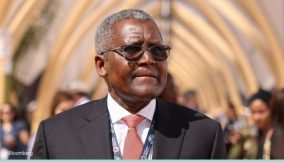Bismarck Rewane, chief executive officer of Financial Derivatives Company, has urged the Central Bank of Nigeria (CBN) to prioritise stabilising the naira and controlling money supply growth as a critical step to mitigating inflationary pressures.
The money supply, measured broadly as M3, hit an unprecedented high of N109 trillion in September 2024. This figure represents a 1.68 percent increase from the N107.19 trillion recorded in August 2024. The CBN data also revealed a year-on-year increase of 62.8 percent, up from N66.94 trillion in September 2023.
According to Rewane, between August and now, the exchange rate has depreciated by 5.1 percent at the official market and 6.9 percent at the parallel market, noting the divergence between the parallel and official exchange rates due to foreign exchange supply constraints – shortage of foreign currency in the official market and market speculation and sentiment.
Speaking on Tuesday during the 2024 Macroeconomic Outlook Forum organised by Parthian Group in Lagos, Rewane outlined the challenges facing Nigeria’s economy while providing a cautiously optimistic outlook for 2025.
“The CBN needs to continue to prioritise taming money growth and stabilising the naira,” he said. “This is the shortest route to moderating inflationary pressure.”
Rewane noted that Nigeria’s economic recovery in 2025 depends on the implementation of well-sequenced reforms and macroeconomic stability, noting that the economy is set to exit the most painful phase of its reform-adjustment process next year.
He highlighted that inflation, while still high, is expected to begin cooling by mid-2025. However, he stressed the importance of stabilising the macroeconomic environment before aggressively pursuing growth.
“Stabilisation comes before growth. If you pursue growth before macroeconomic stabilisation, you will be putting the cart before the horse. There is a need to align public expectations with the policy direction.”
Rewane emphasised that investment plays a central role in economic recovery and growth, but investor confidence depends on transparency and policy consistency.
“Revenue alone is not enough. Investment is key, but it is influenced by confidence, transparency, and the right policies,” he stated. He further called for structural reforms to address inefficiencies in critical sectors such as power and oil and gas, identifying high energy costs as a significant driver of inflation.
Discussing Nigeria’s foreign exchange system, Rewane noted that the fundamentals suggest a stronger naira but achieving stability requires efficient management of the FX market.
He critiqued the sequencing of reforms in Nigeria, asserting that poorly coordinated policies and insufficient structural adjustments have hindered the country’s progress. “The primary challenge lies not in the reforms themselves but in their management,” he remarked.
Rewane’s remarks came as part of his keynote presentation at the Parthian Economic Discourse 2024, held on November 20, 2024, in Lagos. The event, themed, ‘Policy Shifts: Strengthening Economic Institutions for Sustainable Growth,’ brought together economic experts, policymakers, and business leaders to discuss Nigeria’s economic trajectory.
During a panel session that followed the keynote, moderated by Benson Uwheru, group executive and chief operating officer of Parthian Group, several experts provided additional perspectives on the reforms needed for sustainable economic growth. Panelists included Olayinka David-West, associate dean of Lagos Business School; Olufemi Shobanjo, CEO of NGX Regulation Limited; Chinyere Almona, director general of the Lagos Chamber of Commerce and Industry; and Yemi Sadiku, executive director of Parthian Group.
David-West underscored the need for Nigeria to adopt a “digital-first mindset,” advocating the use of artificial intelligence and other technologies to improve fiscal discipline and economic planning.
Almona identified power supply inefficiencies as a critical barrier to growth and called for immediate action to address high-energy costs. Shobanjo highlighted the role of capital market liquidity in driving investor confidence and economic stability, while Sadiku emphasised the importance of creating policies that attract private sector-led infrastructure investments.
The event concluded with a collective call for strategic action to address the root causes of Nigeria’s economic challenges. Rewane reinforced this sentiment, stating, “The things outside our control far exceed what we can control, but by addressing these root causes, Nigeria can unlock sustainable growth and economic stability.”
Join BusinessDay whatsapp Channel, to stay up to date
Open In Whatsapp





